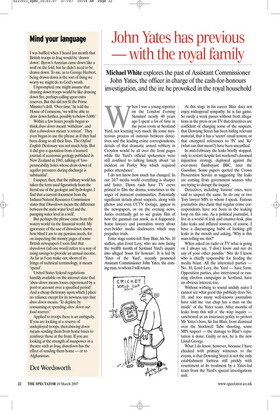Mind your language
I was baffled when I heard last month that British troops in Iraq would be ‘drawn down’. Byron’s Assyrian came down like a wolf on the fold, but he didn’t need to be drawn down. To me, as to George Herbert, being drawn down is the sort of thing we worry we might do to God’s wrath.
Unprompted, one might assume that drawing down troops would be like drawing down fire, perhaps calling upon extra reserves. But this did not fit the Prime Minister’s drift. ‘Over time,’ he told the House of Commons, ‘we will be able to draw down further, possibly to below 5,000.’ Within a few hours people began to think draw down meant ‘withdraw’, and that a drawdown meant ‘a retreat’. They even began to use the phrase as if they had been doing so all their lives. The Oxford English Dictionary was not much help. But it did give a quotation from a learned journal of economic geology published in New Zealand in 1965, talking of ‘lowpermeability holes whose draw-down of aquifer pressures during discharge is substantial’.
I suspect, then, that the military world has taken the term used figuratively from the literal use of the geologist and hydrologist. I find that a current document from the Indiana Natural Resources Commission states that ‘Drawdown means the difference between the static water level and the pumping water level in a well’.
But perhaps the phrase came from the watery world via the financial world. My ignorance of the use of drawdown shows how blind I am to my pension needs, for on inspecting the money pages of some British newspapers I soon find that drawdown (all one word) refers to a way of using savings to provide an annual income. As far as I can make out, shorn of its fringe of technical terminology, it means ‘spend’.
United States federal regulations handily available on the internet state that ‘draw-down means losses experienced by a pool or account over a specified period’. And a cheap dictionary upon which I place no reliance except for its newness says that draw down means, ‘To deplete by consuming or spending: drew down our food reserves.’ Applied to troops there is an ambiguity. If you are looking at a reserve of undeployed troops, then drawing down means sending them from home bases to reinforce those at the front. If you are looking at the strength of manpower in a theatre such as Iraq, drawdown has the effect of sending them home — or to Afghanistan.
Dot Wordsworth


























































































 Previous page
Previous page